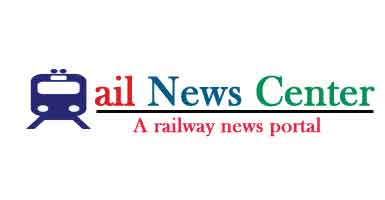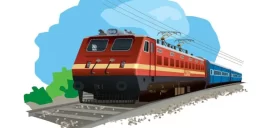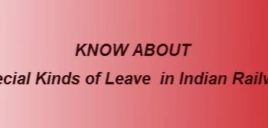Syllabus for the selection in the category of JE (Elect.) Level-6
The question paper will be in two parts first part of technical knowledge and second part about establishment and general matters as above. At least one question from the second part will be compulsory.
I) Shop Management
1. Knowledge of functions of Time Keeping Office and procedure for gate passes.
2. Knowledge of incentive schemes, work order system, booking, booking of labour hours, etc. production planning and workshop documents processing.
3. Stock and non-stock and procedure for indenting and drawl of stores and return of serviceable and scrap items, Stores Depot.
4. Various registers maintained in shops and their need.
5. Stock verification authorities and periodicity.
6. Various safety measures to be followed on the shop floor in general and for various machines and equipment in particular.
7. Staff protective clothing and their entitlements.
8. Methods to control consumption of etored and electric energy.
II. TECHNICAL KNOWLEDGE:
1. BASIC ELECTRICAL UNITS:
Definitions and their relations, Volts, Amperes, Ohm, Capacitance, Impedance, Resistance, Series & Parallel connections.
2. ELECTRICAL MEASURING INSTRUMENTS & MEASUREMENTS.
Types and their applications, AC, DC instruments, their connections, arrangements, types, latest instruments.
3. DC MACHINES:
Motor, generators, their constructions, various parts, their functions and connections.
4. AC MACHINES:
Alternator. motors. types. constructions, Knowledge of various parts and functions, connections, starting arrangement & methods, application of various types of motors.
5. TRANSFORMERS:
Power transformers, distribution transformers, Parallel operation of 3 phase transformers, Current transformers, Voltage Transformers, Transformation ratio functions, simple calculations, capacity rating, current voltage ratios.
6. INSTALLATION:
Precautions during erection, connections, earthing. maintenance schedules.
7. CABLES: –
Types, Grades construction, usage, rating, capacity, methods of laying underground and overhead cables, Fault detection, Methods of laying cables across Railway tracks, testing and commissioning.
8. WIRING:
Types and various accessories, testing types and various accessories, Quarter wiring/ Stair case wiring, commissioning, grades & capacity of wires used and safety equipment.
9. TRANSMISSION OF ELECTRICAL ENERGY:
Knowledge of overhead and underground cables and junctions.
10. INSULATION MATERIALS:
Knowledge of various insulation methods, grades, insulation, types, compounds, break down values and units of measurements.
11. LIGHTING FITTINGS:
Their types, construction & connection.
12. TOOLS & PLANT:
Knowledge of various tools used for electrical works and measuring testing instruments and knowledge of their use.
13. CONTROL SWITCHGEAR:
Knowledge of various control equipment, their purpose. grade, rating, capacity, various types of switches for LT & HT circuit,
14. SUB-STATION:
Types, erection, testing & commissioning and maintenance of various equipment safety requirement. Protective equipment and maintenance schedule. Maintenance of Log Book in manned sub-stations, procedures for making entries in the Log Book procedure for arranging permit to work etc. safety procedure and records to be maintained, methods of testing electrical installation and prescribed safe values for various LT & HT installations.
15. Precautions and action to be taken to avoid accidents. Action to be taken in case of accidents, artificial, renunciations, first aid, firefighting in case of electrical fires.
16. PUMPS:
Knowledge of types of pumps, their construction, names various parts, material used for their construction, efficiency rating, capacity, suction, delivery head, erection, testing & commissioning, methods of starting, lubrication, advantage of various types of pumps, pressure gauges, control values, strainer foot valve, precautions for starting, safety equipment & protection arrangement, trouble shooting and remedies.
17. AIR CONDITIONING & REFRIGERATION:
Type of air conditioning equipment basic units, temperature humidity, velocity, tachometer, dehumidification, dry and wet bulb temperatures, thermometer reading. pressure gauges, thermometer, types of refrigerants used for refrigeration. Type of compressors, lubrication & grade of compressor oil used, suction & delivery pressures, oil pressure, refrigerator cycle and names and function of various equipment. Water cooling system. Line diagram of the refrigeration and water circulation and air delivery circuits.
Operations and maintenance of various AC/refrigeration equipment. Trouble shooting and their remedies.
18. SUPPLY & RETURN AIR-DUCT & DISTRIBUTION ARRANGEMENT :
Insulation and insulating materials for air ducts and refrigerant pipes. Air filter etc types and cleaning safety equipment for AC plants, fire protection methods and their maintenance. Knowledge of electrical equipment and control of various equipment relevant to AC plant and their circuitry. Working knowledge of water softening plants, condensers their operations, regeneration etc. problem of sealing, chemical and mechanical methods of removing them, knowledge of various tools and instruments & instruments used in Air-conditioning and refrigeration.
19. BATTERIES:
Type of batteries, construction, knowledge of charging and discharging their maintenance, checking of SPSRK gravity and other precautions for maintenance of batteries.
20. Reading of simple diagrams and circuit diagrams, reading of electrical and refrigeration circuit diagrams.
21. Knowledge of electrical safety regulations, I.E. Rules
III. STORES ACCOUNTS:
Specifications, indenting procedures PL Numbers, Units, Stock/ Non stock items. Direct Purchase, Procurement Procedures. Agencies, Withdrawal from Stores. Issue from Stores. Accountal of materials, Consumable / Non consumable items, T&P, M&P. preparation of requisition, various records to be maintained, Stock verification etc. storage of materials, safety and security of stores.
IV. ENERGY CONSERVATION:
Various energy conservation measures adopted in DMW. Power factor improvement, Energy Efficient fittings. Non- conventional energy sources fuel consumption on DH Set vis a vis load, photo electric switches, photo electric cells, electronics regulators etc.
V. General & Establishment Knowledge
1. Knowledge of Railway Servants Conduct Rules. Discipline & Appeal Rules.
2. Knowledge of Establishment Rules like Leave Entitlement etc.
3. D&AR Rules: Various definitions, the applicability, suspension and issue of minor penalty charge-sheet, appeals since the Sr. Subordinates are authorized to issue minor penalty charge sheets etc.
4. Rules for engagement and discharge of casual labours/ substitutes and knowledge of relevant sections in the Industrial Disputes etc.
5. Workmen’s Compensation Act.
6. Factory Act.
7. Hours of Employment Regulations.
8. Various types of leave which can be granted to staff.
9. vii. Railway Service Conduct Rules.
10. General Knowledge about working of various other departments in Railways.
11. Staff Council and Rules of its formation/ working.
12. Cannons of financial propriety.
VI. राजभाषा
1. भारत सरकार का राजभाषा नीति का सामन्य परिचय।
2. राजभाषा अधिनियम 1963 तथा राजभाषा संशोधन अधिनियम 1976
3. प्रचलित शब्दाबली।
ALSO SEE

Syllabus – Departmental Examination Railway
Disclaimer: The Information /News /Video provided in this Platform has been collected from different sources. We Believe that “Knowledge Is Power” and our aim is to create general awareness among people and make them powerful through easily accessible Information. NOTE: We do not take any responsibility of authenticity of Information/News/Videos.
This entry was posted in 2 Railway Employee, Syllabus, Railway Employee











